
Voltaire, Candide ou l'Optimisme (1759, 1784 Keyl ed.)
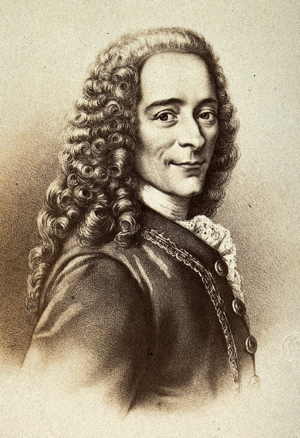 |
 |
| François-Marie Arouet (“Voltaire”) (1694-1778) | Candide fleeing the battle field. |
This is part of a collection of works by Voltaire.
Source
Oeuvres complètes de Voltaire. Ed. Condorcet. Illustrations by Jean-Michel Moreau. ([S. l.], de l’Imprimerie de la Société Littéraire-Typographique, 1784-1789). 70 volumes. "Candide" T. 44 (1785), pp. 220-343.
Source: ETH-Bibliothek Zürich <https://www.e-rara.ch/zut/doi/10.3931/e-rara-28661>.
Note: This edition of Voltaire's works contains 93 illutrations made by Jean-Michel Moreau (1741-1814) of which 11 were made for Candide. [See below.]
See the facs. PDF of Candide from this edition.
Illustrations
 |
Le lendemain après le dîner, comme on sortait de table, Cunégonde et Candide se trouvèrent derrière un paravent; Cunégonde laissa tomber son mouchoir, Candide le ramassa, elle lui prit innocemment la main, le jeune homme baisa innocemment la main de la jeune demoiselle avec une vivacité, une sensibilité, une grâce toute particulière; leurs bouches se rencontrèrent, leurs yeux s’enflammèrent, leurs genoux tremblèrent, leurs mains s’égarèrent. Monsieur le baron de Thunder-ten-tronckh passa auprès du paravent, et voyant cette cause et cet effet, chassa Candide du château à grands coups de pied dans le derrière; Cunégonde s’évanouit; elle fut souffletée par madame la baronne dès qu’elle fut revenue à elle-même; et tout fut consterné dans le plus beau et le plus agréable des châteaux possibles. The next day, as they were rising from dinner, Cunegund and Candide slipped behind the screen. The miss dropped her handkerchief, the young man picked it up. She innocently took hold of his hand, and he as innocently kissed hers with a warmth, a sensibility, a grace—all very particular; their lips met; their eyes sparkled; their knees trembled; their hands strayed. The baron chanced to come by; he beheld the cause and effect, and, without hesitation, saluted Candide with some notable kicks on the breech, and drove him out of doors. The lovely Miss Cunegund fainted away, and, as soon as she came to herself, the baroness boxed her ears. Thus a general consternation was spread over this most magnificent and most agreeable of all possible castles. |
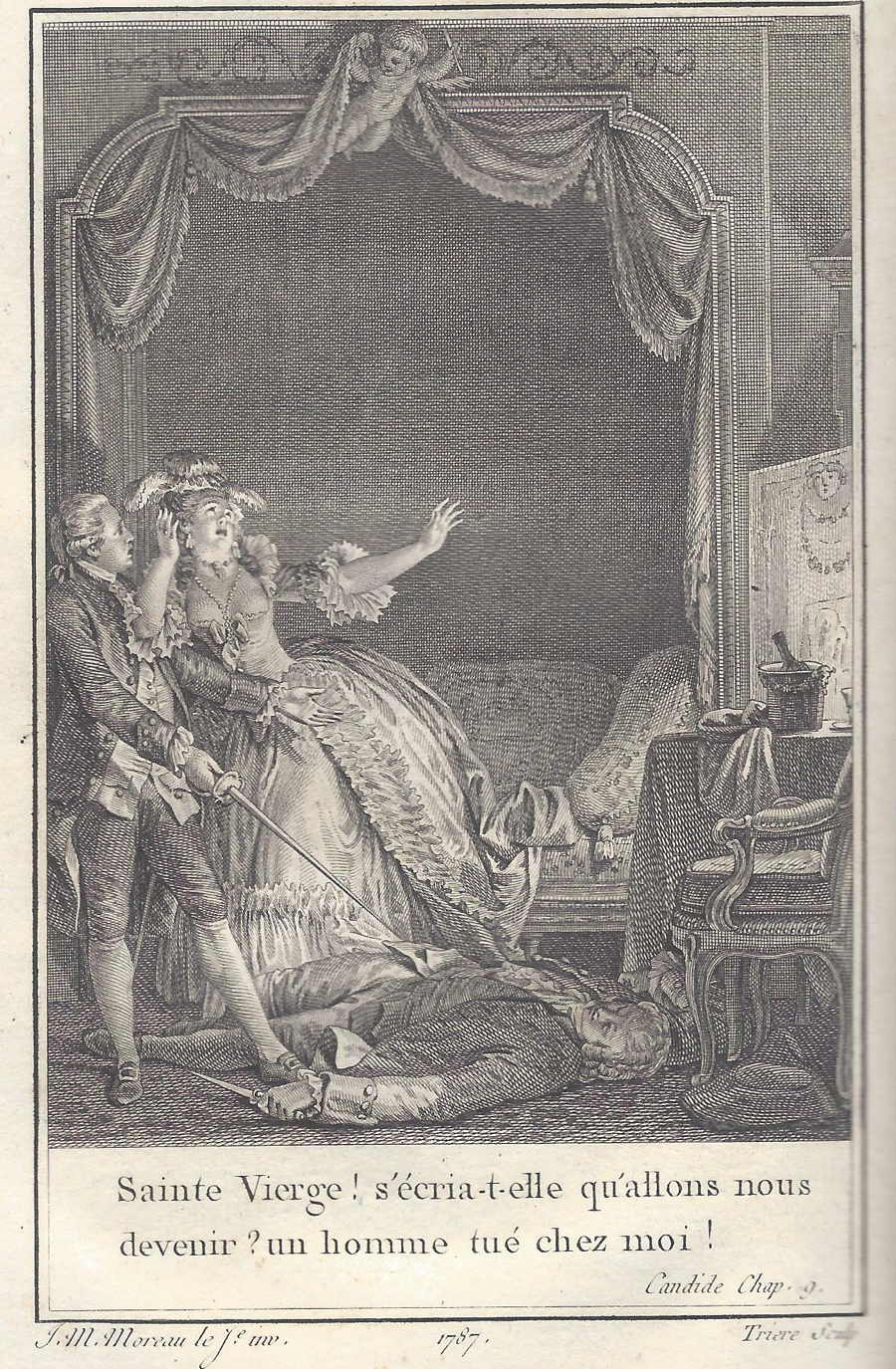 |
Sainte Vierge ! s’écria-t-elle, qu’allons-nous devenir? un homme tué chez moi ! si la justice vient, nous sommes perdus. Si Pangloss n’avait pas été pendu, dit Candide, il nous donnerait un bon conseil dans cette extrémité, car c’était un grand philosophe. A son défaut consultons la vieille. Elle était fort prudente, et commençait à dire son avis quand une autre petite porte s’ouvrit. Il était une heure après minuit, c’était le commencement du dimanche. Ce jour appartenait à monseigneur l’inquisiteur. Il entre et voit le fessé Candide l’épée à la main, un mort étendu par terre, ["Cunégonde effrayée, et"] Cunégonde effarée, et la vieille donnant des conseils. “Holy Virgin!” cried she, “what will become of us? A man killed in my apartment! If the peace-officers come, we are undone.” “Had not Pangloss been hanged,” replied Candide, “he would have given us most excellent advice, in this emergency; for he was a profound philosopher. But, since he is not here, let us consult the old woman.” She was very sensible, and was beginning to give her advice, when another door opened on a sudden. It was now one o’clock in the morning, and of course the beginning of Sunday, which, by agreement, fell to the lot of my lord inquisitor. Entering he discovers the flagellated Candide with his drawn sword in his hand, a dead body stretched on the floor, Cunegund frightened out of her wits, and the old woman giving advice. |
 |
... ils entrent dans Surinam. La première chose"] En approchant de la ville ils rencontrèrent un nègre étendu par terre, n’ayant plus que la moitié de son habit, c’est-à-dire d’un caleçon de toile bleue; il manquait à ce pauvre homme la jambe gauche et la main droite. Eh ! mon Dieu ! lui dit Candide en hollandais, que fais-tu là, mon ami, dans l’état horrible où je te vois? J’attends mon maître monsieur Vanderdendur le fameux négociant, répondit le nègre. Est-ce monsieur Vanderdendur, dit Candide, qui t’a traité ainsi? Oui, monsieur, dit le nègre, c’est l’usage. On nous donne un caleçon de toile pour tout vêtement deux fois l’année. Quand nous travaillons aux sucreries, et que la meule nous attrape le doigt, on nous coupe la main: quand nous voulons nous enfuir, on nous coupe la jambe: je me suis trouvé dans les deux cas. C’est à ce prix que vous mangez du sucre en Europe. Cependant lorsque ma mère me vendit dix écus patagons sur la côte de Guinée, elle me disait: Mon cher enfant, bénis nos fétiches, adore-les toujours, ils te feront vivre heureux; tu as l’honneur d’être esclave de nos seigneurs les blancs, et tu fais par là la fortune de ton père et de ta mère. Hélas ! je ne sais pas si j’ai fait leur fortune, mais ils n’ont pas fait la mienne. Les chiens, les singes et les perroquets sont mille fois moins malheureux que nous: les fétiches hollandais qui m’ont converti me disent tous les dimanches que nous sommes tous enfants d’Adam, blancs et noirs. Je ne suis pas généalogiste, mais si ces prêcheurs disent vrai, nous sommes tous cousins issus de germain. Or vous m’avouerez qu’on ne peut pas en user avec ses parents d’une manière plus horrible. ["omet l’épisode de l’esclave, et enchaîne: notre félicité; ils entrent dans Surinam. La première chose"] O Pangloss ! s’écria Candide, tu n’avais pas deviné cette abomination; c’en est fait, il faudra qu’à la fin je renonce à ton ["optimisme. Qu’est-ce l’optimisme? disait"] optimisme. Qu’est-ce qu’optimisme? disait Cacambo. Hélas ! dit Candide, c’est la rage de soutenir que tout est bien quand on est mal. Et il versait des larmes en regardant son nègre, et en pleurant il entra dans Surinam.
As they drew near the town they saw a negro stretched on the ground with only one half of his habit, which was a kind of linen frock; for the poor man had lost his left leg and his right hand. “Good God,” said Candide in Dutch, “what dost thou here, friend, in this deplorable condition?” “I am waiting for my master, Mynheer Vanderdendur, the famous trader,” answered the negro. “Was it Mynheer Vanderdendur that used you in this cruel manner?” “Yes, sir,” said the negro; “it is the custom here. They give a linen garment twice a year, and that is all our covering. When we labor in the sugar works, and the mill happens to snatch hold of a finger, they instantly chop off our hand; and when we attempt to run away, they cut off a leg. Both these cases have happened to me, and it is at this expense that you eat sugar in Europe; and yet when my mother sold me for ten patacoons on the coast of Guinea, she said to me, ‘My dear child, bless our fetiches; adore them forever; they will make thee live happy; thou hast the honor to be a slave to our lords the whites, by which thou wilt make the fortune of us thy parents.’ Alas! I know not whether I have made their fortunes; but they have not made mine: dogs, monkeys, and parrots are a thousand times less wretched than I. The Dutch fetiches who converted me tell me every Sunday that the blacks and whites are all children of one father, whom they call Adam. As for me, I do not understand anything of genealogies; but if what these preachers say is true, we are all second cousins; and you must allow that it is impossible to be worse treated by our relations than we are.” “O Pangloss!” cried out Candide, “such horrid doings never entered thy imagination. Here is an end of the matter; I find myself, after all, obliged to renounce thy Optimism.” “Optimism,” said Cacambo, “what is that?” “Alas!” replied Candide, “it is the obstinacy of maintaining that everything is best when it is worst.” And so saying he turned his eyes towards the poor negro, and shed a flood of tears; and in this weeping mood he entered the town of Surinam. |
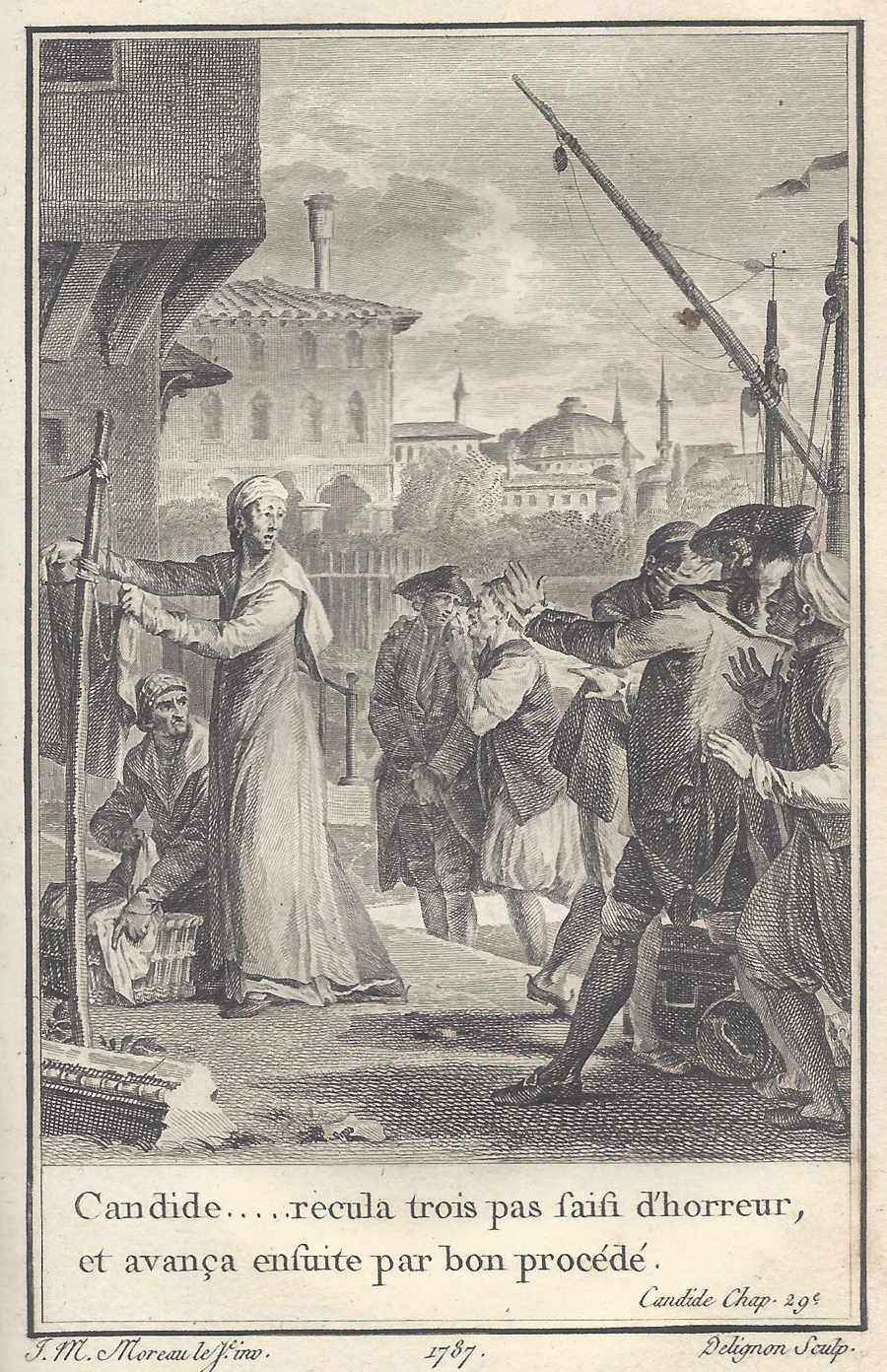 |
Pendant que Candide, le baron, Pangloss, Martin et ["Cacambo continuaient le récit de leurs [Voltaire à ajouté au-dessus de la ligne ‘le récit de’]"] Cacambo, contaient leurs aventures, qu’ils raisonnaient sur les événements contingents ou non contingents de cet univers, qu’ils disputaient sur les ["effets et sur les"] effets et les causes, sur le mal moral et sur le mal physique, sur la liberté et la nécessité, sur les consolations que l’on peut éprouver lorsqu’on est aux galères en Turquie, ils abordèrent sur le rivage de la Propontide à la maison du prince de Transylvanie. Les premiers objets qui se présentèrent furent Cunégonde et la vieille, qui étendaient des serviettes sur des ficelles pour les faire sécher. Le baron pâlit à cette vue. Le tendre amant Candide en voyant sa belle Cunégonde rembrunie, les yeux éraillés, la gorge sèche, les joues ridées, les bras rouges et écaillés, recula trois pas saisi d’horreur, et avança ensuite par bon procédé. Elle embrassa Candide et son frère: on embrassa la vieille: Candide les racheta toutes deux.
While Candide, the baron, Pangloss, Martin, and Cacambo, were relating their several adventures, and reasoning on the contingent or non-contingent events of this world; on causes and effects; on moral and physical evil; on free will and necessity; and on the consolation that may be felt by a person when a slave and chained to an oar in a Turkish galley, they arrived at the house of the Transylvanian prince on the coasts of the Propontis. The first objects they beheld there, were Miss Cunegund and the old woman, who were hanging some tablecloths on a line to dry. The baron turned pale at the sight. Even the tender Candide, that affectionate lover, upon seeing his fair Cunegund all sunburnt, with blear eyes, a withered neck, wrinkled face and arms, all covered with a red scurf, started back with horror; but, recovering himself, he advanced towards her out of good manners. She embraced Candide and her brother; they embraced the old woman, and Candide ransomed them both. |
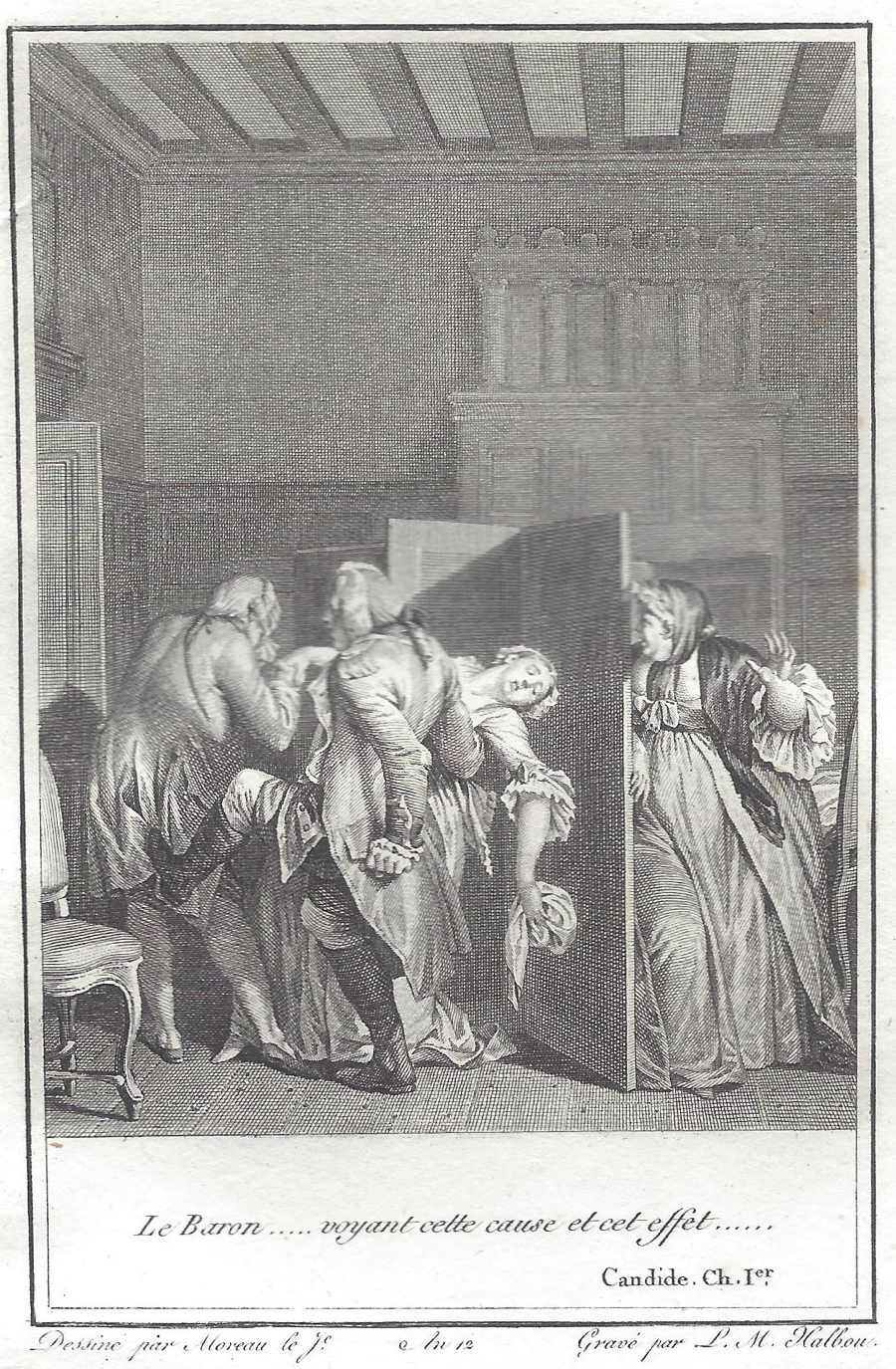 |
Cunégonde s’évanouit; elle fut souffletée par madame la baronne dès qu’elle fut revenue à elle-même; et tout fut consterné dans le plus beau et le plus agréable des châteaux possibles.
The lovely Miss Cunegund fainted away, and, as soon as she came to herself, the baroness boxed her ears. Thus a general consternation was spread over this most magnificent and most agreeable of all possible castles. |
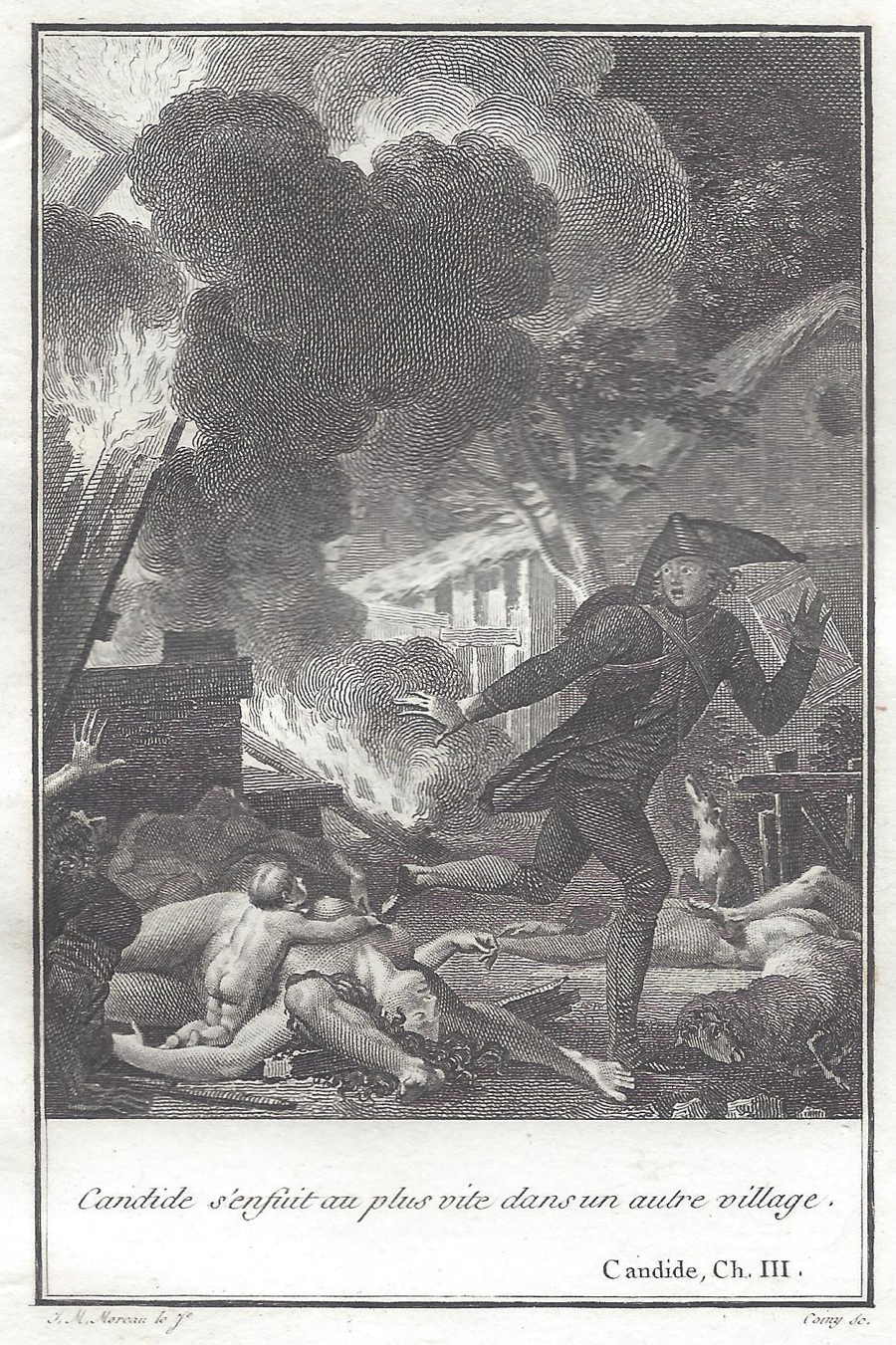 |
Rien n’était si beau, si leste, si brillant, si bien ordonné que les deux armées. Les trompettes, les fifres, les hautbois, les tambours, les canons, formaient une harmonie telle qu’il n’y en eut jamais en enfer. Les canons renversèrent d’abord à peu près six mille hommes de chaque côté; ensuite la mousqueterie ôta du meilleur des mondes environ neuf à dix mille coquins qui en infectaient la surface. La baïonnette fut aussi la raison suffisante de la mort de quelques milliers d’hommes. Le tout pouvait bien se monter à une trentaine de mille âmes. Candide qui tremblait comme un philosophe, se cacha du mieux qu’il put pendant cette boucherie héroïque. Enfin, tandis que les deux rois faisaient ["chanter le Te deum"] chanter des Te Deum, chacun dans son camp, il prit le parti d’aller raisonner ailleurs des effets et des causes. Il passa par-dessus des tas de morts et de mourants, et gagna d’abord un village voisin; il était en cendres: c’était un village abare que les Bulgares avaient brûlé selon les lois du droit public. Ici des vieillards criblés de coups regardaient mourir leurs femmes égorgées, qui tenaient leurs enfants à leurs mamelles sanglantes; là des filles, éventrées après avoir assouvi les besoins naturels de quelques héros, rendaient les derniers soupirs; d’autres à demi brûlées criaient qu’on achevât de leur donner la mort. Des cervelles étaient répandues sur la terre à côté de bras et de jambes coupés. Candide s’enfuit au plus vite dans un autre village: il appartenait à des Bulgares; et les héros abares l’avaient traité de ["même. Presque toute la province était ainsi détruite. Candide"] même. Candide toujours marchant sur des membres palpitants, ou à travers des ruines, arriva enfin hors du théâtre de la guerre, portant quelques petites provisions dans son bissac, et n’oubliant jamais mademoiselle Cunégonde. Ses provisions lui manquèrent quand il fut en Hollande: mais ayant entendu dire que tout le monde était riche dans ce pays-là, et qu’on y était chrétien, il ne douta pas qu’on ne le traitât aussi bien qu’il l’avait été dans le château de monsieur le baron avant qu’il en eût été ["chassé à grands coups de pied 〈dans le cu〉"] chassé pour les beaux yeux de mademoiselle Cunégonde.
Never was anything so gallant, so well accoutred, so brilliant, and so finely disposed as the two armies. The trumpets, fifes, hautboys, drums, and cannon made such harmony as never was heard in hell itself. The entertainment began by a discharge of cannon, which, in the twinkling of an eye, laid flat about 6,000 men on each side. The musket bullets swept away, out of the best of all possible worlds, nine or ten thousand scoundrels that infested its surface. The bayonet was next the sufficient reason of the deaths of several thousands. The whole might amount to thirty thousand souls. Candide trembled like a philosopher, and concealed himself as well as he could during this heroic butchery. At length, while the two kings were causing Te Deums to be sung in their camps, Candide took a resolution to go and reason somewhere else upon causes and effects. After passing over heaps of dead or dying men, the first place he came to was a neighboring village, in the Abarian territories, which had been burned to the ground by the Bulgarians, agreeably to the laws of war. Here lay a number of old men covered with wounds, who beheld their wives dying with their throats cut, and hugging their children to their breasts, all stained with blood. There several young virgins, whose bodies had been ripped open, after they had satisfied the natural necessities of the Bulgarian heroes, breathed their last; while others, half burned in the flames, begged to be despatched out of the world. The ground about them was covered with the brains, arms, and legs of dead men. Candide made all the haste he could to another village, which belonged to the Bulgarians, and there he found the heroic Abares had enacted the same tragedy. Thence continuing to walk over palpitating limbs, or through ruined buildings, at length he arrived beyond the theatre of war, with a little provision in his budget, and Miss Cunegund’s image in his heart. When he arrived in Holland his provision failed him; but having heard that the inhabitants of that country were all rich and Christians, he made himself sure of being treated by them in the same manner as at the baron’s castle, before he had been driven thence through the power of Miss Cunegund’s bright eyes. |
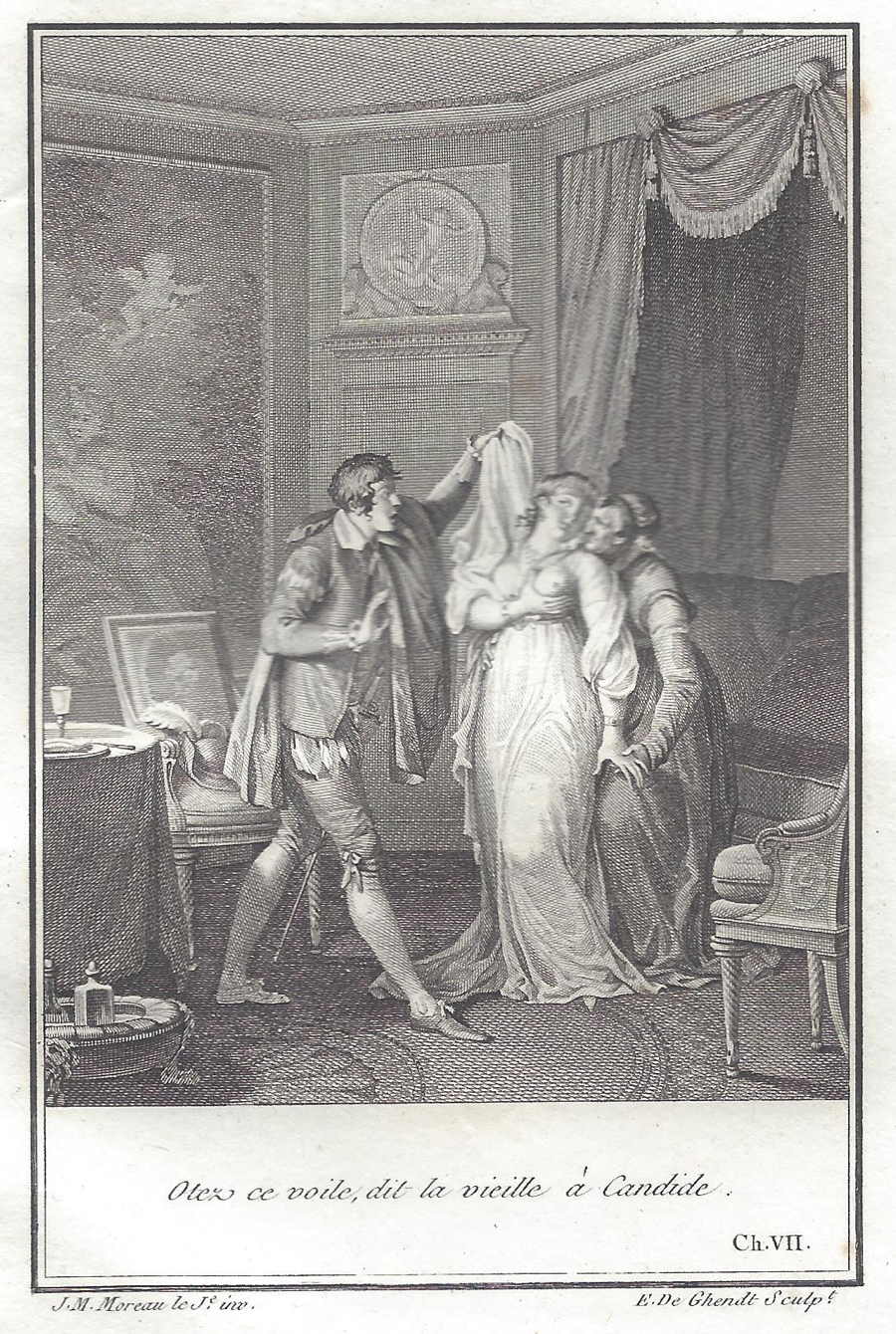 |
La vieille reparut bientôt; elle soutenait avec peine une femme tremblante, d’une taille majestueuse, brillante de pierreries, et couverte d’un voile. Otez ce voile, dit la vieille à Candide. Le jeune homme approche; il lève le voile d’une main timide. Quel moment ! quelle surprise ! ["il crut voit"] il croit voir mademoiselle Cunégonde, il la voyait en effet, c’était elle-même. La force lui manque, il ne peut proférer une parole, il tombe à ses pieds. Cunégonde tombe sur le canapé. La vieille les accable d’eaux spiritueuses; ils reprennent leurs sens, ils se parlent: ce sont d’abord des mots entrecoupés, des demandes et des réponses qui se croisent, des soupirs, des larmes, des cris. La vieille leur recommande de faire moins de bruit, et les laisse en liberté. Quoi ! c’est vous, lui dit Candide, vous vivez ! Je vous retrouve en Portugal ! On ne vous a ["donc point violée"] donc pas violée? On ne vous a point fendu le ventre, comme le philosophe Pangloss me l’avait assuré? Si fait, dit la belle Cunégonde; mais on ne meurt pas toujours de ces deux accidents. Mais votre père et votre mère ont-ils été tués? Il n’est que trop vrai, dit Cunégonde en pleurant. Et votre frère? Mon frère a été tué aussi. Et pourquoi êtes-vous en Portugal? et comment avez-vous su que j’y étais? et par quelle étrange aventure m’avez-vous fait conduire dans cette
The old woman soon returned, supporting, with great difficulty, a young lady, who appeared scarce able to stand. She was of a majestic mien and stature, her dress was rich, and glittering with diamonds, and her face was covered with a veil. “Take off that veil,” said the old woman to Candide. The young man approached, and, with a trembling hand, took off her veil. What a happy moment! What surprise! He thought he beheld Miss Cunegund; he did behold her—it was she herself. His strength failed him, he could not utter a word, he fell at her feet. Cunegund fainted upon the sofa. The old woman bedewed them with spirits; they recovered—they began to speak. At first they could express themselves only in broken accents; their questions and answers were alternately interrupted with sighs, tears, and exclamations. The old woman desired them to make less noise, and after this prudent admonition left them together. “Good heavens!” cried Candide, “is it you? Is it Miss Cunegund I behold, and alive? Do I find you again in Portugal? then you have not been ravished? they did not rip open your body, as the philosopher Pangloss informed me?” “Indeed but they did,” replied Miss Cunegund; “but these two accidents do not always prove mortal.” “But were your father and mother killed?” “Alas!” answered she, “it is but too true!” and she wept. “And your brother?” “And my brother also.” “And how came you into Portugal? And how did you know of my being here? And by what strange adventure did you contrive to have me brought into this house? And how—” “I will tell you all,” replied the lady, “but first you must acquaint me with all that has befallen you since the innocent kiss you gave me, and the rude kicking you received in consequence of it.” |
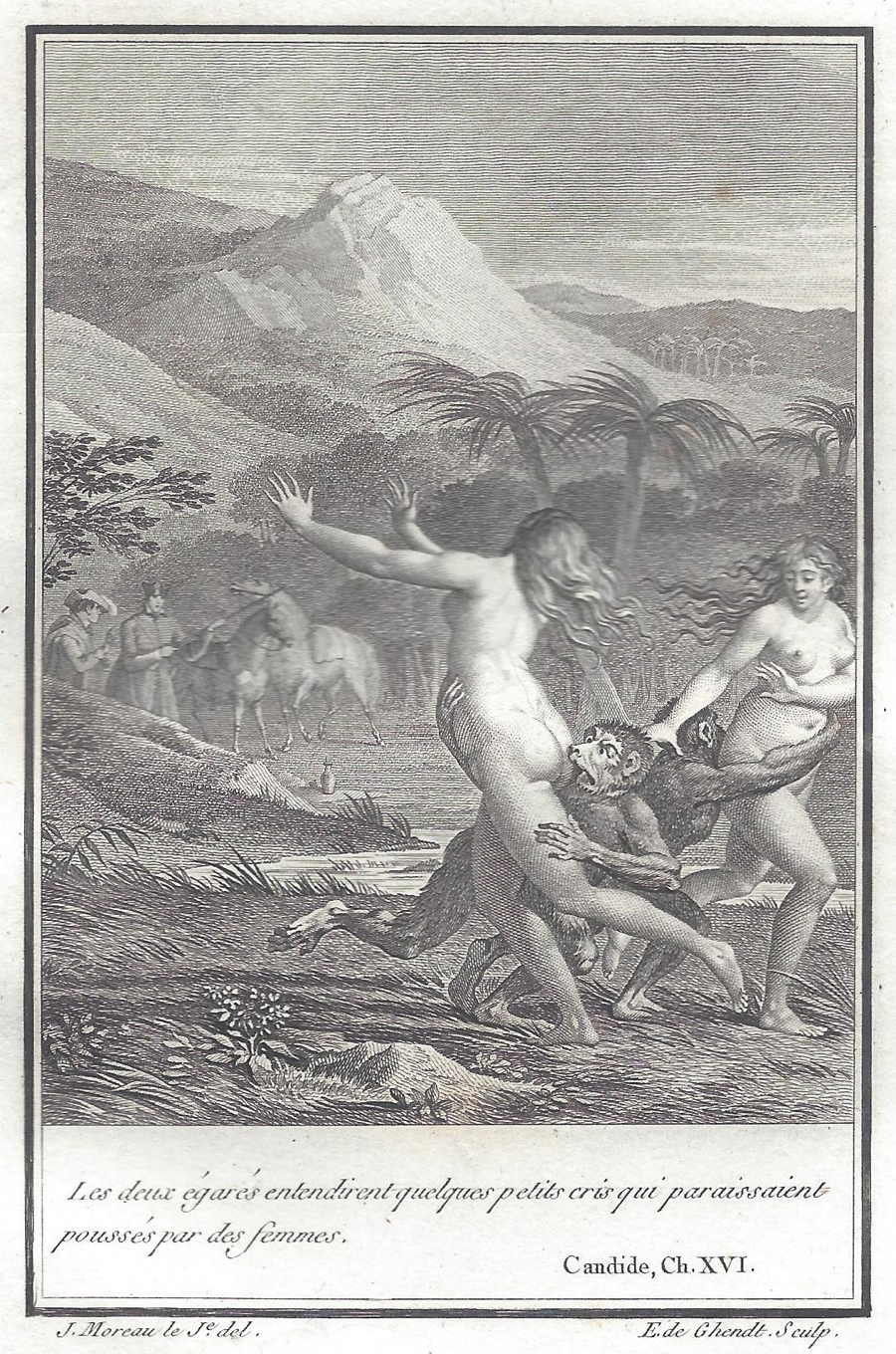 |
En parlant ainsi il ["ne laissait pas"] ne laissa pas de manger. Le soleil se couchait. Les deux égarés entendirent quelques petits cris qui paraissaient poussés par des femmes. Ils ne savaient si ces cris étaient de douleur ou de joie; mais ils se ["levèrent précisément avec"] levèrent précipitamment avec cette inquiétude et cette alarme que tout inspire dans un pays inconnu. Ces clameurs partaient de deux filles toutes nues qui couraient légèrement au bord de la prairie, tandis que deux singes les suivaient en leur mordant les fesses. Candide fut touché de pitié: il avait appris à tirer chez les Bulgares, et il aurait abattu une noisette dans un buisson sans ["toucher 〈les〉 aux feuilles [‘aux’ a été ajouté au-dessus de la ligne]"] toucher aux feuilles. Il prend son fusil espagnol à deux coups, tire, et tue les deux singes. Dieu soit loué, mon cher Cacambo, j’ai délivré d’un grand péril ces deux pauvres créatures; si j’ai commis un péché en tuant un inquisiteur et un jésuite, je l’ai bien réparé en sauvant la vie à deux filles. Ce sont peut-être deux demoiselles de condition, et cette aventure nous peut procurer de très grands avantages dans le pays.
While he was making these reflections he still continued eating. The sun was now on the point of setting when the ears of our two wanderers were assailed with cries which seemed to be uttered by a female voice. They could not tell whether these were cries of grief or of joy; however, they instantly started up, full of that inquietude and apprehension which a strange place naturally inspires. The cries proceeded from two young women who were tripping disrobed along the mead, while two monkeys followed close at their heels biting at their limbs. Candide was touched with compassion; he had learned to shoot while he was among the Bulgarians, and he could hit a filbert in a hedge without touching a leaf. Accordingly he took up his double-barrelled Spanish gun, pulled the trigger, and laid the two monkeys lifeless on the ground. |
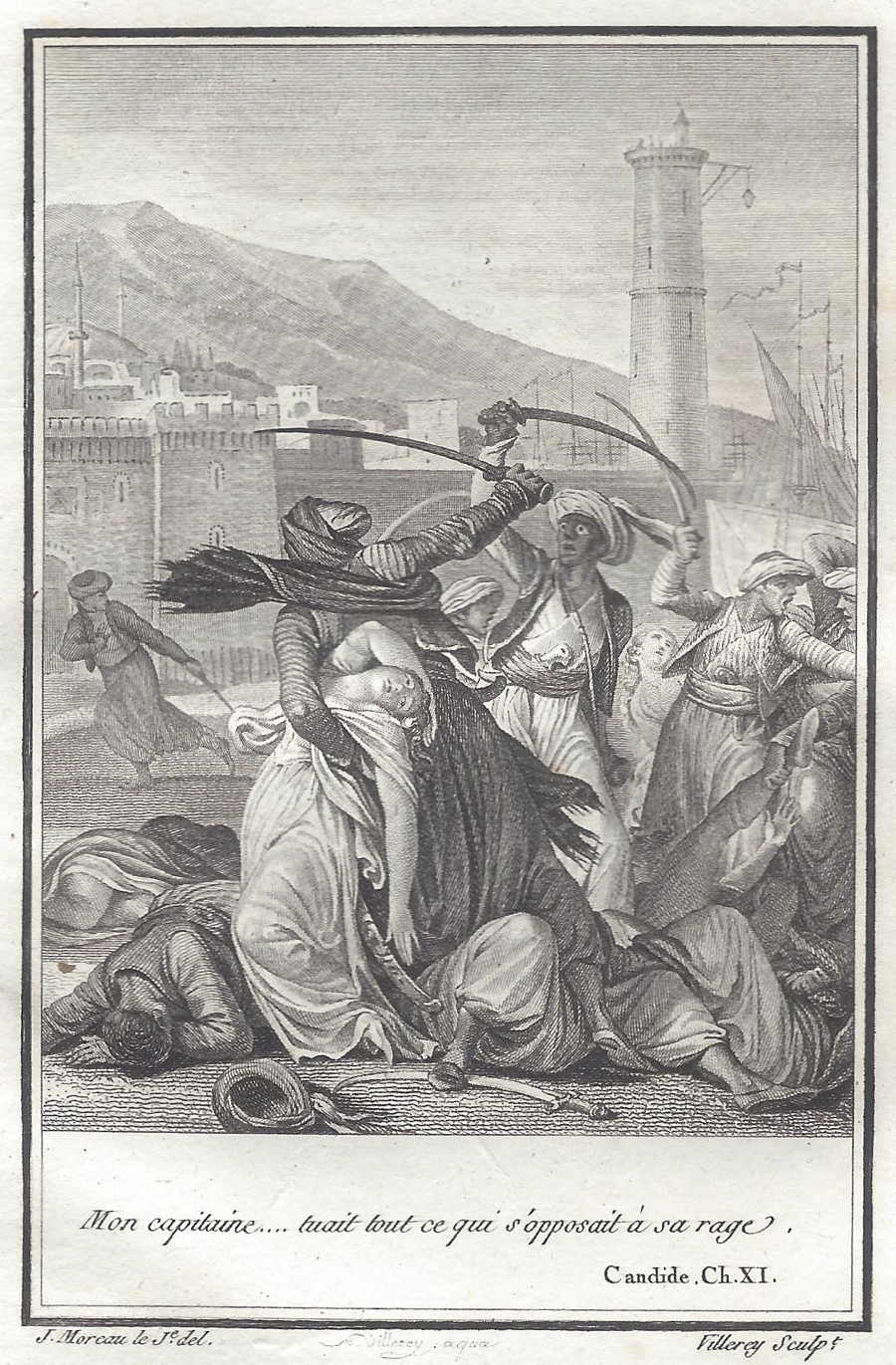 |
Maroc nageait dans le sang quand nous arrivâmes. Cinquante fils de l’empereur Mulei-Ismaël avaient chacun leur parti: ce qui produisait en effet cinquante guerres civiles, de noirs contre noirs, de noirs contre basanés, de basanés contre basanés[", de mulâtres contre mulâtres"] , de mulâtres contre mulâtres. C’était un carnage continuel dans toute l’étendue de l’empire. A peine fûmes-nous Italiennes et ma mère déchirées, coupées, massacrées par les monstres qui se les disputaient. Les captifs mes compagnons, ceux qui les avaient pris, soldats, matelots, noirs, ["omet: basanés"] basanés, blancs, mulâtres, et enfin mon capitaine, tout fut tué, et je demeurai mourante sur un tas de morts. Des scènes pareilles se passaient, ["comme chacun sait"] comme on sait, dans l’étendue de plus de trois cents lieues[", sans qu’on [...] Mahomet"] , sans qu’on manquât aux cinq prières par jour ordonnées par Mahomet.
“Upon our arrival at Morocco we found that kingdom deluged with blood. Fifty sons of the emperor Muley Ishmael were each at the head of a party. This produced fifty civil wars of blacks against blacks, of tawnies against tawnies, and of mulattoes against mulattoes. In short, the whole empire was one continued scene of carnage. “No sooner were we landed than a party of blacks, of a contrary faction to that of my captain, came to rob him of his booty. Next to the money and jewels, we were the most valuable things he had. I witnessed on this occasion such a battle as you never beheld in your cold European climates. The northern nations have not that fermentation in their blood, nor that raging lust for women that is so common in Africa. The natives of Europe seem to have their veins filled with milk only; but fire and vitriol circulate in those of the inhabitants of Mount Atlas and the neighboring provinces. They fought with the fury of the lions, tigers, and serpents of their country, to decide who should have us. A Moor seized my mother by the right arm, while my captain’s lieutenant held her by the left; another Moor laid hold of her by the right leg, and one of our corsairs held her by the other. In this manner almost all of our women were dragged by four soldiers. My captain kept me concealed behind him, and with his drawn scimitar cut down everyone who opposed him; at length I saw all our Italian women and my mother mangled and torn in pieces by the monsters who contended for them. The captives, my companions, the Moors who took us, the soldiers, the sailors, the blacks, the whites, the mulattoes, and lastly, my captain himself, were all slain, and I remained alone expiring upon a heap of dead bodies. Similar barbarous scenes were transacted every day over the whole country, which is of three hundred leagues in extent, and yet they never missed the five stated times of prayer enjoined by their prophet Mahomet. |
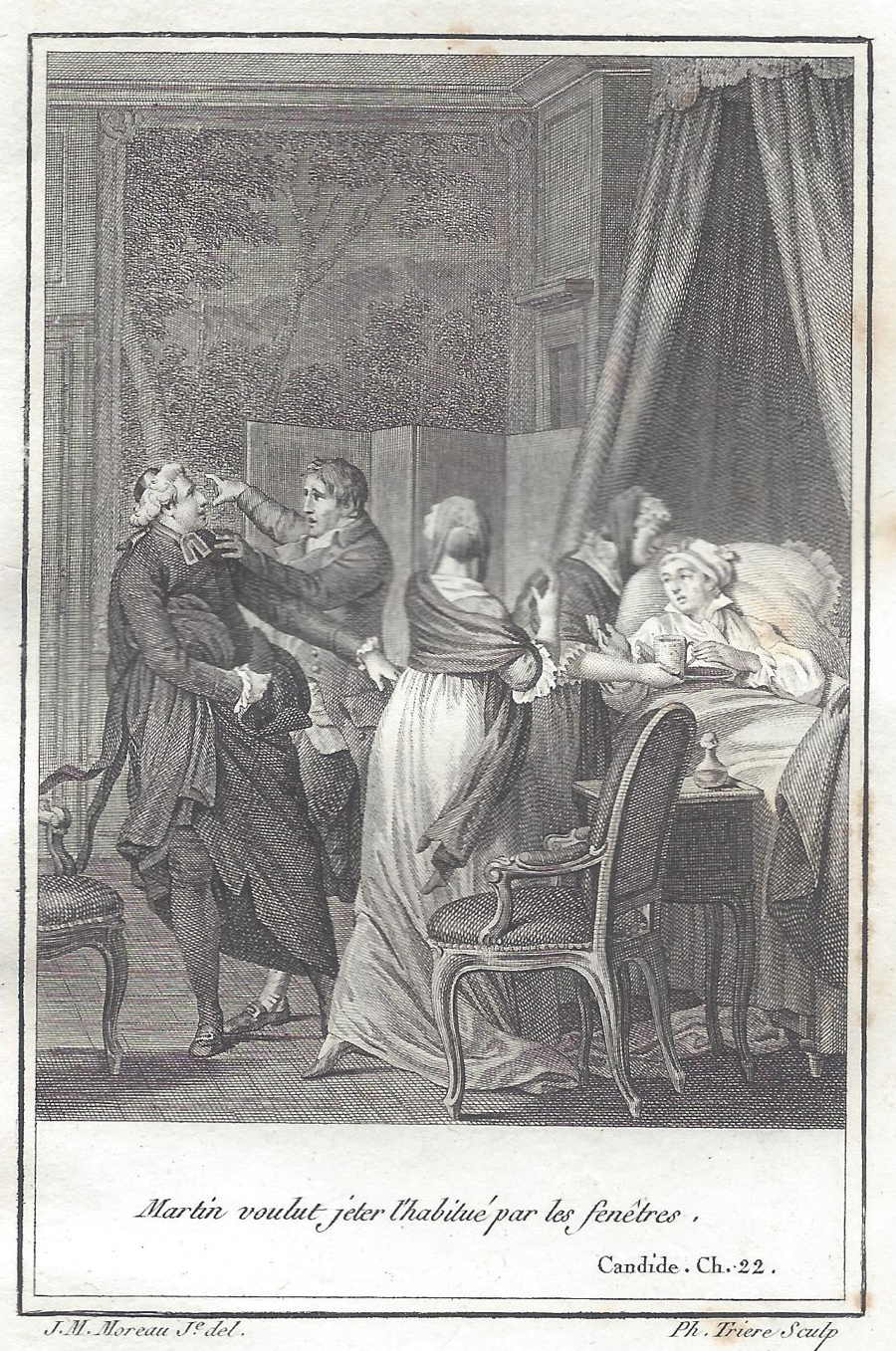 |
Cependant, à force de médecines et de saignées, la maladie de Candide devint sérieuse. Un habitué du quartier vint avec douceur lui demander un billet payable au porteur pour l’autre monde. Candide n’en voulut rien faire; les dévotes l’assurèrent que c’était une nouvelle mode. ["Candide dit qu’il"] Candide répondit qu’il n’était point homme à la mode. Martin voulut jeter l’habitué par les fenêtres. Le clerc jura qu’on n’enterrerait point Candide. Martin jura qu’il enterrerait le clerc s’il continuait à les importuner. La querelle s’échauffa, Martin le prit par les épaules et le chassa rudement; ce qui causa un grand scandale dont on fit un procès-verbal. Candide guérit: et pendant sa convalescence il eut très bonne compagnie à souper chez lui. On jouait gros jeu. Candide était tout étonné que jamais les as ne lui vinssent: et Martin ne s’en étonnait pas.
However, by dint of purging and bleeding, Candide’s disorder became very serious. The priest of the parish came with all imaginable politeness to desire a note of him, payable to the bearer in the other world. Candide refused to comply with his request; but the two devotees assured him that it was a new fashion. Candide replied, that he was not one that followed the fashion. Martin was for throwing the priest out of the window. The clerk swore Candide should not have Christian burial. Martin swore in his turn that he would bury the clerk alive if he continued to plague them any longer. The dispute grew warm; Martin took him by the shoulders and turned him out of the room, which gave great scandal, and occasioned a procèsverbal. Candide recovered, and till he was in a condition to go abroad had a great deal of good company to pass the evenings with him in his chamber. They played deep. Candide was surprised to find he could never turn a trick; and Martin was not at all surprised at the matter. |
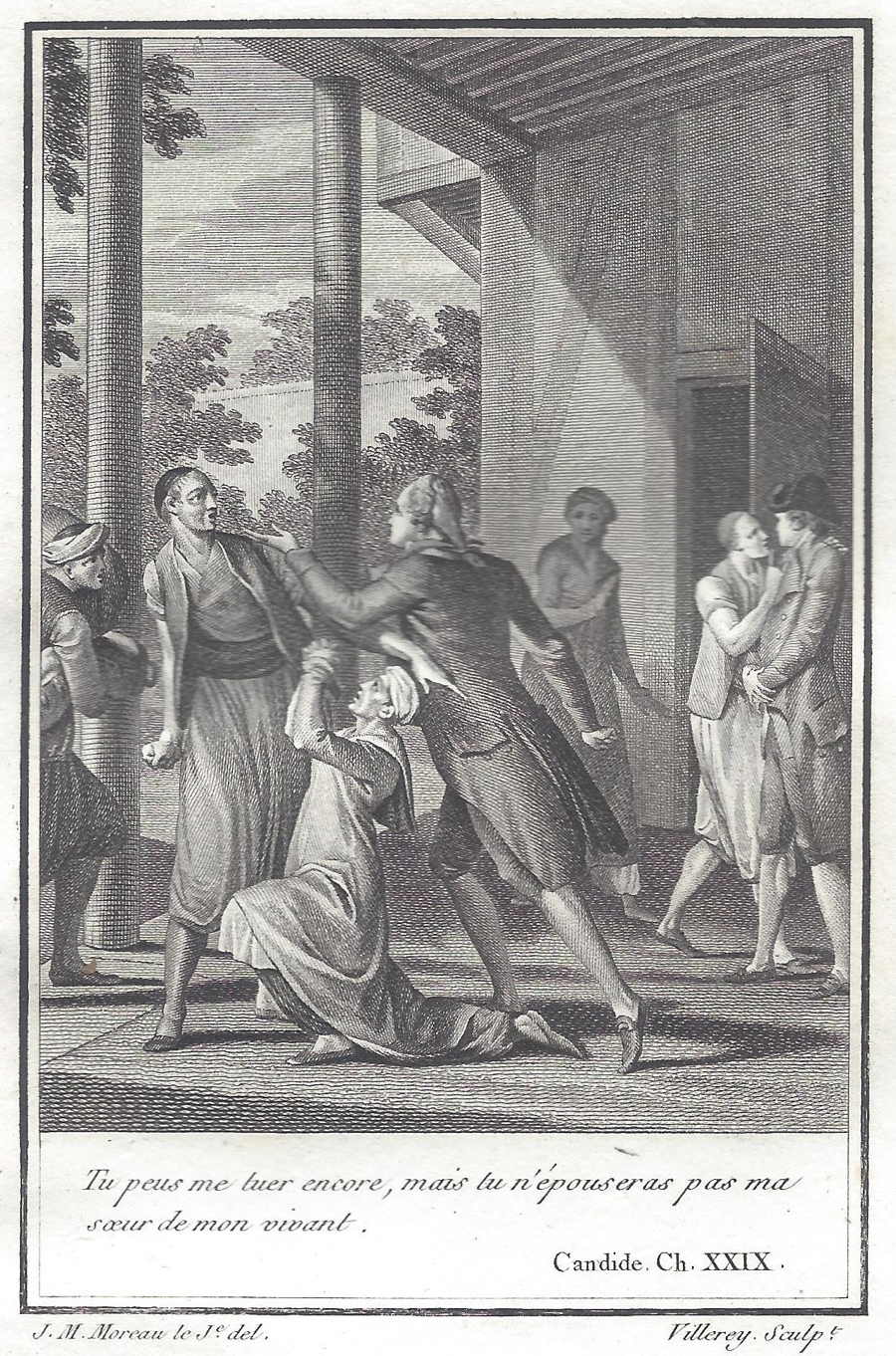 |
Il y avait une petite métairie dans le voisinage; la vieille proposa à Candide de s’en accommoder, en attendant que toute la troupe eût une meilleure destinée. Cunégonde ne savait pas qu’elle était enlaidie, personne ne l’en avait avertie: elle fit souvenir Candide de ses promesses avec un ton si absolu, que le bon Candide n’osa pas la refuser. Il signifia donc au baron qu’il ["allait enfin se"] allait se marier avec sa sœur. Je ne souffrirai jamais, dit le baron, une telle bassesse de sa part, et une telle insolence de la vôtre; cette infamie ne me sera jamais reprochée: les enfants de ma sœur ne pourraient entrer dans les chapitres d’Allemagne. Non, jamais ma sœur n’épousera qu’un baron de l’empire. Cunégonde se jeta à ses pieds, et les baigna de larmes; il fut inflexible. Maître fou, lui dit Candide, je t’ai réchappé des galères, j’ai payé ta rançon, j’ai payé celle de ta sœur; elle lavait ici des écuelles, elle est laide, j’ai la bonté d’en faire ma femme, et tu prétends encore t’y opposer; je te retuerais si j’en croyais ma colère. Tu peux me tuer encore, dit le baron, mais tu n’épouseras pas ma sœur de mon vivant.
There was a small farm in the neighborhood, which the old woman proposed to Candide to make shift with till the company should meet with a more favorable destiny. Cunegund, not knowing that she was grown ugly, as no one had informed her of it, reminded Candide of his promise in so peremptory a manner, that the simple lad did not dare to refuse her; he then acquainted the baron that he was going to marry his sister. “I will never suffer,” said the baron, “my sister to be guilty of an action so derogatory to her birth and family; nor will I bear this insolence on your part: no, I never will be reproached that my nephews are not qualified for the first ecclesiastical dignities in Germany; nor shall a sister of mine ever be the wife of any person below the rank of a baron of the empire.” Cunegund flung herself at her brother’s feet, and bedewed them with her tears; but he still continued inflexible. “Thou foolish fellow,” said Candide, “have I not delivered thee from the galleys, paid thy ransom, and thy sister’s, too, who was a scullion, and is very ugly, and yet condescend to marry her? and shalt thou pretend to oppose the match! If I were to listen only to the dictates of my anger, I should kill thee again.” “Thou mayest kill me again,” said the baron; “but thou shalt not marry my sister while I am living.” |